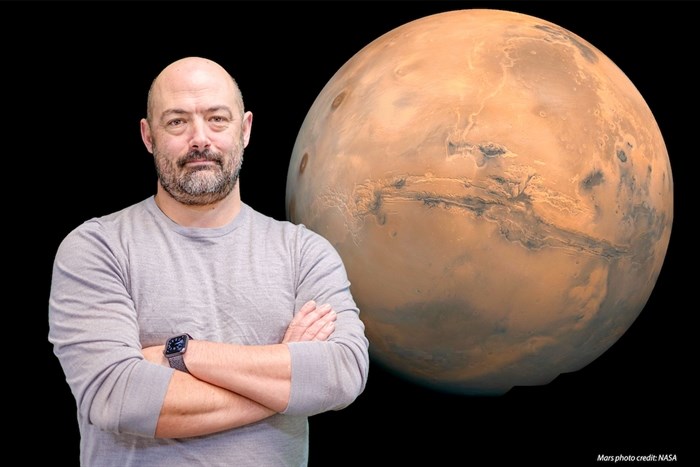
Gord Binstead is among the researchers from UBC Okanagan in Kelowna going to a Mars simulator in Hawaii.
Image Credit: SUBMITTED / UBCO / NASA
November 26, 2019 - 1:00 PM
A team of Canadian researchers is headed to a simulated Mars habitat on Hawaii’s Mauna Loa at the end of the month, and among their ranks are some locals.
The team of researchers heading to the Hawaii Space Exploration Analog and Simulation lab consists of scientists from UBC’s Okanagan campus, the University of Victoria and the University of Calgary. Their mission launches with the objective of designing and running experiments to measure the brain function of astronauts as they become fatigued.
“Crew time on space missions is planned right down to the minute,” Gord Binsted, Dean in the Faculty of Health and Social Development at UBC Okanagan and one of the research leaders said, in a press release. “The challenge for us is to create an experiment that is simple enough for any of the crew to perform within very tight time constraints, likely 20 to 30 minutes per day, while still generating valuable scientific data.”
The researchers will be expected to continue the regular operations and maintenance of the habitat while they conduct scientific work, which Binsted says will help them understand the rigours astronauts will be under as they design their experiments.
The team will study a concept called cognitive fatigue, where the brain begins to make poor decisions the more tired it gets.
“Previous research has shown that the brain still functions normally if you’re a little fatigued. But at a certain point, the cumulative effect of over-fatigue means that the brain falls off a cliff and things like memory recall, mood and decision making are significantly impaired,” Binsted said. “Poor decision making can be fatal in the context of a space mission.”
Olav Krigolson, associate professor at UVic and co-lead researcher, says the team hopes to use an electroencephalogram to map the electrical activity of the brain as it becomes fatigued to predict when it’s about to fall off that cliff and lead to poor decisions.
“We’ll be using a simple but powerful consumer-grade EEG device called Muse and a smartphone to conduct our experiments,” Krigolson said. “Ten years ago, this kind of equipment would have been much larger and cost $100,000, but today we’re able to carry everything in one hand for just a few hundred dollars, making it ideal for a space mission.”
The research team will be in the Mars simulation for eight days. While they won’t ever leave the surface of Earth, Binsted said the experience will be as real as it gets.
“The site is barren and completely isolated from civilization. There’s a 40-minute time delay on all communications, the six-member crew will be living in a 1,200-square-foot habitat and we’ll have to wear spacesuits to go outside,” explains Binsted. “It’s all pretty surreal.”
“I was even asked by the organizers what size spacesuit I wear,” he said. “I had no idea what to say.”
Findings from the mission could have wide-ranging impacts on any occupation facing long work hours and critical decision making, including emergency room physicians, pilots or heavy equipment operators.
The team departs on Nov. 28 and will be blogging their experience throughout the mission at www.destinationmars.ca. Team members include Olav Krigolson from the University of Victoria, Gord Binsted from UBC Okanagan, Kent Hecker from the University of Calgary, Michaela Musilova from Hawaii Space Exploration Analog and Simulation and International Moonbase Alliance, and the University of Hawaii, and Ph.D. students Chad Williams and Tom Ferguson from UVic.
To contact a reporter for this story, email Kathy Michaels or call 250-718-0428 or email the editor. You can also submit photos, videos or news tips to the newsroom and be entered to win a monthly prize draw.
We welcome your comments and opinions on our stories but play nice. We won't censor or delete comments unless they contain off-topic statements or links, unnecessary vulgarity, false facts, spam or obviously fake profiles. If you have any concerns about what you see in comments, email the editor in the link above.
News from © iNFOnews, 2019